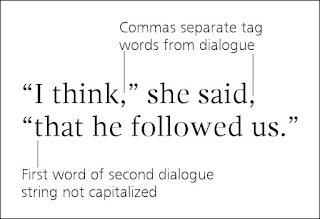Now and then you can reverse the order to give variety to your story.
Another way to add variety is to put the tag text in the middle of the dialogue.
Things become more complex when you quote somebody who is telling you what a third person said. This involves two sets of quotation marks, standard double ones, with single ones inside. In British usage, these two quotation mark customs are reversed. In Britain, single quotations marks are standard for general use, and double ones are used for the inside quotation.
Little changes when the quotation is a question or exclamation. Use the appropriate ending punctuation, always inside the ending quotation mark.
The last example is for those times when you talk to yourself in your stories. If you actually spoke aloud, you could punctuate it with quotation marks. But if you are using thoughts as a form of dialogue, you have two choices. You can put the contents of the thought in italics to set it off, or you can leave it plain. Until recently, standard usage was to leave it plain. That is a remnant of typewriter days when italics were not an option. Today usage is split between plain text and italics. Follow standard dialogue punctuation rules, minus quotation marks.
This explanation has covered only dialogue. Quotation marks are also used to set off irony, some titles, unfamiliar words you are using for the first time, and words you are defining. Many people also use them to give emphasis to words. This latter usage is not technically pure, but if you don't overdo it, the Grammar Police will leave you alone.
According to the Grammar Police, any time you use quotation marks, all ending punctuation is always placed inside the final quotation mark. Being the rebellious and free spirit that I am, when it simply doesn't look right and make sense to follow that dictate, I say, “Rules are made to be broken.” Let common usage begin to drive rule creep. I'm not advocating punctuation riots and chaos here, but let reason and good judgement prevail.
And that, Gentle Readers, is all there is to it. Now, how about writing a story with some dialogue in it to give those cool illustrations a reason for being?
Write on,
Sharon Lippincott, aka Ritergal







7 comments :
A lot of the time I will write quickly and forget some of thoe rules. If I had an editor the editor would have killed me by now.
Super post! Thank you for making it so clear and fun to read.
Here's a question for you: why is this the correct grammar in the following sentence?
>> From that day, they decided to call that karate move a "jokehold." <<
The period is inside the endquote, right? Why is that? What's the rule why that happens?
Thank you for a perfect example of a sentence where I'd consider thumbing my nose at the Grammar Police.
Aside from grammatical correctness, my right (aesthetic) brain says things look tidy with end punctuation wrapped inside the final ".
The logical left side of my brain says "jokehold" is a unique entity, and its purity is polluted by including general punctuation within its wrapper.
It's your call, and trust me, I will not report you to the GPs. Go for it and contribute to the stream of general usage that feeds Rule Creep. Thanks again.
I love this! I was having trouble remembering those rules recently!
I'm so glad I know where to locate this info to use in some editing I'm doing, as well as my own writing. I rarely color inside the lines, but it is at least nice to know where those lines are!
Joie
this ol' english prof learned--and taught-- that a ; and a : both appeared outside the closing quotation mark.
[Being a Luddite, I don't know what HTML tags, are dear Ritergal.]
---Love from Marian in Oregon
Perfect, perfect, perfect!! This is exactly what I needed!
Post a Comment